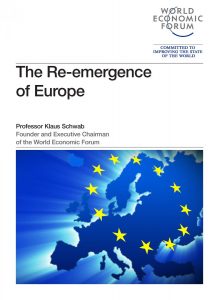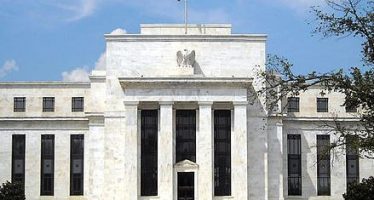Europe Has Nothing to Fear but Fear Itself
By Klaus Schwab, Dec 14th 2012
 The eurozone will not break up. The price of departure is simply too great for any one country. Indeed, when Mario Draghi announced on 6 September that the European Central Bank (ECB) would undertake unlimited purchases of government bonds, the continent crossed the bridge to its future.
The eurozone will not break up. The price of departure is simply too great for any one country. Indeed, when Mario Draghi announced on 6 September that the European Central Bank (ECB) would undertake unlimited purchases of government bonds, the continent crossed the bridge to its future.
Europe’s leaders must see that the drawbridge has been lifted behind them. They cannot back out of this, and thus must steel themselves for the journey ahead. Moreover, they must also realize that for the European project to succeed – which it must – monetary union must be accompanied by four other kinds of union: a banking union; a fiscal union; a “competitiveness” union, or convergence; and, to all intents and purposes, a political union. And to be sustainable over the long term, the continent’s political economy must be capable of reintegrating its youth and present an ideal worth fighting for.
This is a long and ambitious list, but the deeper one thinks about the European situation, the more inevitable these conclusions become.
“The eurozone will not break up. The price of departure is simply too great for any one country.”
Ever closer European integration, since Belgium, France, West Germany, Italy, Luxembourg and the Netherlands signed the Treaty of Paris in April 1951, has been of enduring benefit to generations. Can we imagine a European history without the development of institutions designed to bring European countries together under shared values and common ideals? It is unthinkable.
The euro itself has provided major economic rewards: it eliminated exchange risk, lowered inflation, increased trade across the eurozone, and more tightly integrated European financial markets. More generally, the single currency has contributed to an underlying culture of monetary stability and predictability within the eurozone, a critical point often forgotten in today’s discussions.
The crisis, however, surfaced critical flaws in the eurozone’s structure. Europe lacked a strong and common fiscal policy; divergence in competitiveness between the northern and southern economies created a risk of default that had gone unrecognized; and the absence of a banking union created intolerable systemic risks. Adding fuel to the fire, the complexity of European political institutions, and the increasing democratic deficit that it represents in the view of the public, has led to an “executive deficit”: an inability to make real decisions.

ECB Headquarters
What is clear is that the euro must survive in more or less its current form, but the deficiencies in the institutions that surround it must be addressed. The first is a banking union: an absolute prerequisite for a monetary union to succeed. A robust banking union must have shared bank supervision, a shared bank recapitalization mechanism and a shared bank deposit guarantee. The good news is that the first of these was put in place on 12 September with the proposal of a single supervisory mechanism under the ECB. The two other items are destined to follow, with the ever present caveat in Europe that negotiations will be complex and will take years to resolve.
As the talks of a banking union drag on, they will inevitably lead to discussion of a fiscal union, as the different pieces are intertwined and complement each other – the idea of a banking union without a fiscal backstop makes little sense. There will be three parts to any kind of fiscal union in Europe: a programme of direct bank recapitalization – in Europe’s case, by the European Stability Mechanism; an EU-wide system of deposit insurance that both prevents a run on banks in weaker countries and reduces moral hazard; and some form of debt mutualization.
Before the anti-federalists recoil in dismay, it is important not to fall prey to binary thinking – it is not “everything or nothing”. Between no fiscal union of any kind and a fully-fledged “United States” or Swiss-style confederation, many possible intermediate states exist that would contribute to a much greater sense of fiscal solidarity and discipline.
Reform of European financial governance is a necessary but not sufficient condition for success. It will not be able to gloss over the major issue at the centre of the crisis: the competitiveness gap between Europe’s north and its south. Fixing the EU banking system and regaining macroeconomic stability will do a lot to help southern countries increase their productivity but, importantly, these countries will need to engage in a long-term project to increase their labour market flexibility, foster competition and competitiveness, and make more and better investments in growth-enhancing areas such as education, technology and innovation.
A crucial consequence of all these reforms must be the injection of entrepreneurial energy into the continent’s “lost generation”. Youth unemployment is a cancer at the heart of the European economy, stealing its future and sapping its growth potential for decades to come.

The good news is that reforms are underway. Despite slow progress in implementation, the “Europe 2020” strategy is designed to kick-start competitiveness in the region. I believe that the path ahead is clear, that Europe’s leaders will begin to look forward with hope and optimism and not backward with fear, and that Europe is more likely to confound the pessimists as the year ahead unfolds.
The continent’s optimism will strengthen as leaders recognize that Europe stands together or falls apart. There is no country on the continent sheltered from the pain of this crisis. What is crucial now is that the continent’s polity is able to envision the gain that will emerge from the pain, and is able to articulate this in a way that pulls them towards their shared future.
Professor Klaus Schwab is Founder and Executive Chairman of the World Economic Forum. His e-book, The Re-Emergence of Europe, was published on 14 December and is available free of charge at http://www.weforum.org/re-emergence-europe
You may have an interest in also reading…
IMF: The Risk Side of Exceptionally Low Interest Rates
Several years of exceptionally low interest rates and bond buying by some advanced economy central banks have improved some indicators
It’s not Nuclear Physics: Pension Fund Chief Champions Ethics and Balance
Matthew Eyton-Jones is the CEO of a pension fund with a difference: it provides benefits to the staff and fellows
Lord Waverley on WTO: Inclusive and Sustainable Trade Reforms are Vital for Shared Benefits
The previous US administration, the politicisation of trade and a looming economic crisis due to the pandemic and Brexit are


















































































